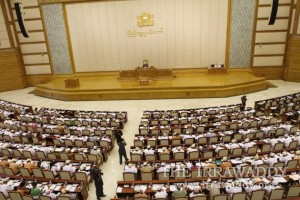A Year of Nascent Reforms to Build Upon
By Burma Partnership • December 22, 2012 2012 has been an eventful year for Burma – a year of initial steps hopefully in the right direction as well as several hurdles that pose serious challenges to the reform process.
2012 has been an eventful year for Burma – a year of initial steps hopefully in the right direction as well as several hurdles that pose serious challenges to the reform process.
In April, Daw Aung San Suu Kyi and 42 other members of the National League for Democracy won their parliamentary seats in a landslide victory for the party. However, parliamentary procedures are obscure and NLD and other progressive MPs are outnumbered by those from the Union Solidarity and Development Party and the military, making it difficult to raise important issues, repeal oppressive laws or push for amendments to draft legislations.
This year, we have seen the release of a significant number of political prisoners. While the freedom of these crucial players in the democratic process was welcomed, the opportunistic nature of the releases and the existing charges against those released cast a dark shadow. Hundreds of political prisoners remain in jail and authorities continue to arrest outspoken activists, including most recently those who have protested against the Letpadaung copper mine, one of many cases of land confiscation throughout the country.
There may have been some opening of space for civil society in the country, but organizations continue to face a restrictive law on their registration and some have had their offices raided by authorities. As we saw with the violent crackdown on monks and lay protesters at the Letpadaung mine, the government is not yet willing to listen to all opposition voices. There have also been less publicized reports of activists’ phones being tapped, individuals followed and even interrogated in their homes by authorities.
The government peace team, led by Union Minister Aung Min, has endeavored to initiate peace negotiations with many of Burma’s ethnic armed groups. While very preliminary ceasefire agreements have been signed with some groups, these are lacking concrete details about the Burma Army’s withdrawal of troops from ethnic areas and an end to human rights violations. The government has refused to heed calls from ethnic groups and the umbrella organization, the United Nationalities Federal Council, to engage in political dialogue to address the underlying issues of inequality and self-determination, or to address problems of natural resource management. Furthermore, there are sporadic armed clashes between the Burma Army and the Shan State Army – North (SSA-N), Shan State Army – South (SSA-S) and the Ta’ang National Liberation Army (TNLA), despite ceasefire agreements.
In Kachin State, there has been virtually no progress towards a ceasefire, armed conflict rages on and human rights violations associated with the presence of Burma Army soldiers are ongoing, including rape and sexual violence against women and girls. This lack of progress towards achieving ceasefire agreements and the urgent humanitarian needs of displaced populations pose a serious threat to the entire reform process. In Kachin State, the Kachin Women’s Association of Thailand reports that an estimated 100,000 people have been displaced due to the fighting. Urgently needed humanitarian assistance is being blocked for the 60,000 people who are in areas controlled by the Kachin Independence Army. Additionally, the United Nations High Commissioner for Refugees estimates that there are another 115,000 Rohingya and Arakanese people displaced due to this year’s violence in Arakan State, not all of whom the agency has been able to assist. The government must allow humanitarian access to these most vulnerable populations.
While there have been some positive developments in the last year, we must be aware of how nascent Burma’s reform process truly is. 2013 will be a year of trying to encourage these reforms to move in the right direction and not letting them be sidelined by ulterior motives of profits and power. We look forward to working with all of you to ensure that the reform process truly benefits the people of Burma.
Our Weekly Highlights will take a short hiatus over the holidays but we will return with a full issue on 14 January.
We wish you happy holidays and all the best for 2013.
In Solidarity,
The Burma Partnership Secretariat
This post is in: Blog
Related PostsBurma Army Displays Blatant Disregard for 21st Century Panglong Peace Process
On Union Day, Reappraisal of the Peace Process is Needed
ရွမ္းျပည္တိုိးတက္ေရးပါတီ၊ ရွမ္းျပည္တပ္မေတာ္ SSPP/SSA ထုတ္ျပန္ေၾကညာခ်က္
Time for the Government to Accept the Reality of Human Rights Problems, Take Effective Measures and Move Forward
Kachin Region: War Torn Displaced Village Profiles









 All posts
All posts